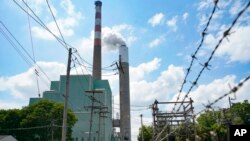A new study released Thursday at the U.N. Climate Conference in Egypt indicates the global energy crisis driven by Russia’s invasion of Ukraine has prompted the world’s governments to push aside climate goals in favor of fossil fuels to shore up energy supplies.
The report, delivered by the Climate Action Tracker Consortium, said rising energy costs and shortages as a result of the Ukraine conflict has made clean energy a lower priority for many governments, which instead are doubling down on the use of fossil fuels.
The report says this has been exacerbated by a worldwide oil and gas industry push to promote fossil fuels as the best way out of the crisis.
The study argues fossil fuels are the cause, not the solution, to the current energy crisis. The consortium argues the use of renewable energy sources, electrification and practicing energy efficiency are by far the cheapest, fastest and most secure options address the issue.
The Climate Action Tracker is an independent scientific analysis consortium, funded by several governments and regional foundations.
It tracks government climate action and measures it against the globally agreed 2015 Paris Agreement, which set a goal to limit global warming to well below 2 — preferably to 1.5 — degrees Celsius compared to pre-industrial levels, and a climate-neutral world by 2050.
The report maintains that plans by many governments to expand the use of liquid natural gas (LNG), for example, will seriously compromise meeting the 1.5°C limit.
The consortium said its analysis finds the LNG capacity now under construction, coupled with current plans to expand construction, could increase emissions by over 1.9 gigatons of carbon dioxide per year by 2030.
The report warns that under the current scenarios, the world is heading for 2.4°C of warming by 2030.
Some information for this report was provided by The Associated Press.









